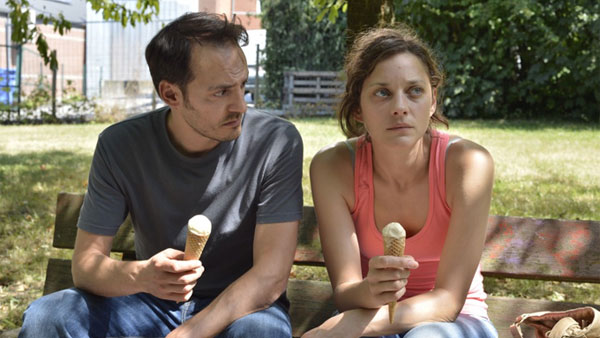Two Days, One Night Review
Two Days, One Night might be the Dardenne brothers’ best film yet.
That’s a big statement considering the filmography in quesiton: La Promesse, Rosetta, L’enfant, The Kid with a Bike—not a dud in the bunch. But it’s a complex, rich film that earns such a label. Anchored by a phenomenal turn by the great Marion Cotillard, it’s the Belgian brothers’ answer to 12 Angry Men—a desperate plea for morality that extends itself over 90 emotionally gripping minutes. The situation at this film’s core, however, contains more shades of gray than did the one in Sidney Lumet’s classic film. Instead of battling over a man’s legal guilt or innocence, Two Days, One Night‘s protagonist asks, “How much is my well-being worth to you?”
Cotillard plays Sandra, a woman who has recently emerged from a bout with severe depression. Unfortunately, the time she spent away from her factory job while she recovered rendered her position redundant. Her bosses say they’ve seen that 16 people can do the job 17 people are currently employed to do, but rather than fire her outright, they pass the buck to their employees and give them a choice: Sandra or your yearly 1,000-euro bonus. The vote is to take place on a Monday morning, which gives Sandra two full days to rally her coworkers on her side. It’s a difficult task for any person, nevermind a woman as fragile as Sandra. But what other choice does she have?
That’s the film: a series of varied pleas to men and women with varying degrees of sympathy for Sandra’s plight. One man openly weeps, guilt-ridden over the fact that he thought about voting against her. Another disparages her character and assaults another man who stands with Sandra. The situation feels a little contrived to start, but there’s not a false note to be found once the Dardennes start exploring this unique community. Everyone values things differently and for different reasons. One woman won’t support Sandra because she wants to add a deck to her house. Another man will almost certainly lose his job in a few months if he does support Sandra, but it’s something he considers anyway. No one is necessarily right or wrong, but they’ll all have to live with the consequences of their decision, and it’s here that the Dardennes find deeply felt power.
Sandra’s depression physically and psychologically manifests itself in Cotillard in such a spectacular way. One could argue about the actress’ best work—The Immigrant, La vie en rose, Rust and Bone, and others are in the conversation—but this is unquestionably Cotillard’s most subtle of her great performances. Her state of mind is entirely believable, despite the obviously good things and people around her. And the way she approaches the monumental challenge in front of her is devastating without feeling at all cloying.
But as good as the performance is, the film is so much more. It’s a feat of editing that prevents a film full of similar confrontations from feeling repetitive. It’s a feat of screenwriting that gives its lead such a complete and life-affirming character arc, not to mention the strong sense of community that’s developed in just 90 minutes.
Finally, it’s a feat of direction. On the world cinema scene, there are few directors as reliably excellent as Jean-Pierre and Luc Dardenne. They proudly make films about people and their problems, and while the scenario is heightened a bit more than usual here, they’ve lost not a bit of their usual down-to-earth potency.

















One Response to Two Days, One Night Review